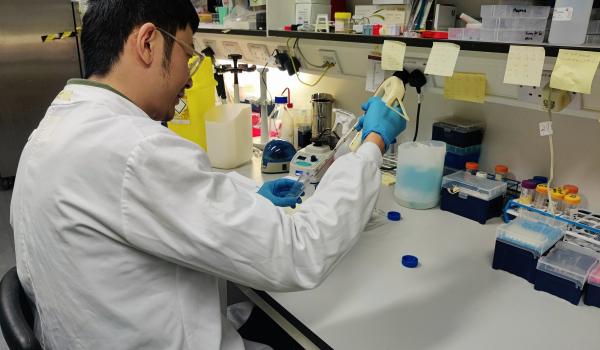ESMO 2023 revealed new data on immunotherapies and targeted therapies as well as novel treatments all with the objective of improving cancer care across Europe.

At this year’s four-day congress, there were four sessions dedicated to gynaecology, and specific focuses on ovarian cancer. Our Chief Executive Annwen Jones OBE attended the congress, meeting with advocates, partner organisations of the World Ovarian Cancer Coalition, of which she is Chair, and funders.
There were many encouraging insights for the ovarian cancer community at this year’s ESMO, including important updates on immunotherapy, checkpoint inhibitor and PARP inhibitor combination treatment trials, more personalised treatment to suit the individual and novel approaches to tackle platinum-resistant disease, as well as developing new treatments for less common sub-types of ovarian cancer. What was clear however was the many areas of unmet needs that must be addressed in ovarian cancer research. And how funding remains, as ever, a major rate-limiting factor.
Key learnings
Target Ovarian Cancer Research Manager Dr Emma Dennett has summarised three key learnings we took away from this year’s ESMO congress, and what it means for the future of ovarian cancer.
Learning 1 - A more personalised approach to treatment is on the horizon
Like other cancers, ovarian cancer isn’t a single disease, there are many distinct types of ovarian cancer that begin in different places – including the ovary, a germ cell (egg), the fallopian tube, the peritoneum – and they have different histology (how the tumour cells look under a microscope) and genetics.
By identifying and understanding biomarkers unique to different tumour types, researchers are increasingly able to predict which tumours will benefit from which treatment. Personalisation means that doctors are able to tailor treatments to individuals, so people are more likely to receive treatments that work for them.
The presentations at ESMO 2023 reflected this personalisation of treatments. Highlights included a session dedicated to molecular profiling of gynaecological cancer with Clare Scott speaking on ovarian cancer.
A phase 2 trial of trastuzumab deruxtecan, a targeted biological therapy, for patients with solid tumours with HER2, including ovarian, showed promising results. The treatment is already approved in some countries for breast cancer and a gastric cancer, so although more trials are needed this provides additional hope that it may be licenced in ovarian cancer.
Learning 2 - Novel approaches into less common sub-types
It was encouraging to see that research into platinum-resistant and less common ovarian cancer types made up a huge part of the conversation around ovarian cancer. Professor Charlie Gourley – whose work we have funded - presented “novel treatment options for PARPi resistant ovarian cancer” as part of a session looking at how to optimise treatment when cancers have progressed following treatment with PARP inhibitors.
One presentation from China discussed a biomarker that indicates which tumours are platinum resistant, and these may also benefit from PARP inhibitors.
The BOUQUET trial reported promising early results when women with persistent or recurrent rare epithelial ovarian cancer were treated with cobimetinib or atezolizumab and bevacizumab, and they will continue to enrol more women in this trial.
Learning 3 - Immunotherapy to treat ovarian cancer
There is much international interest in immunotherapy as a treatment approach for ovarian cancer. This is one of the reasons why we have awarded funding to Professor Sadaf Ghaem-Maghami at Imperial College London.
At the congress, results of a clinical trial using immunotherapy were presented. Raludotatug deruxtecan is an antibody–drug conjugate, which means an antibody which can locate the right cell attached to a chemotherapy drug to kill the cancer cell.
The drug was tested in a phase 1 clinical trial and shown to be safe. The trial is now going on to recruit more people to understand more about the treatment. If this is successful, then a larger trial may follow.
Although it is an exciting time for research into immunotherapy, we are still some years away from immunotherapies being available at the clinic for ovarian cancer.
We know that pioneering research can stop ovarian cancer devastating lives.
ESMO 2023 evidenced that while there is a lot of promising research being done, awarding funding to research projects remains vital to continue making progress in addressing the complexities of ovarian cancer.
Find out more about the recent projects we have awarded funding to and see how your donation could help stop ovarian cancer devastating lives.



